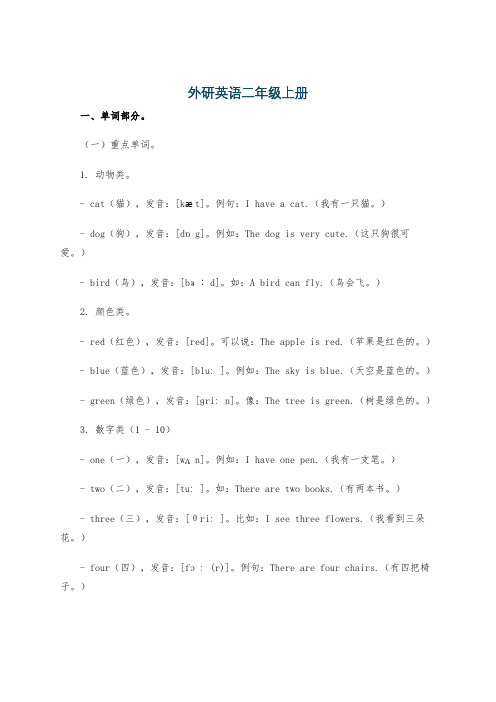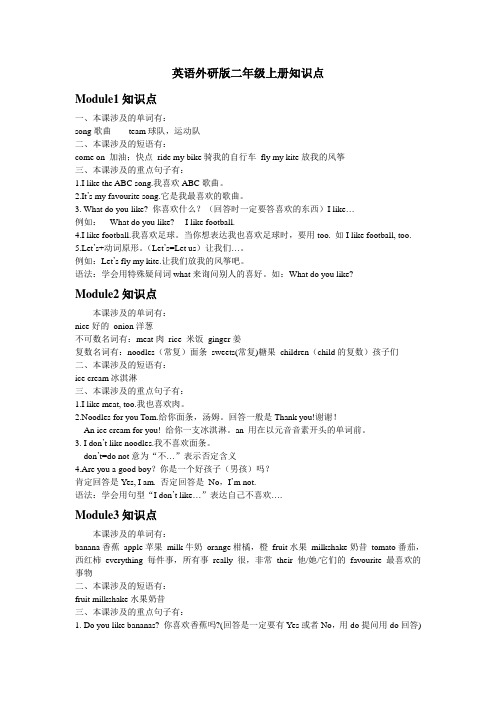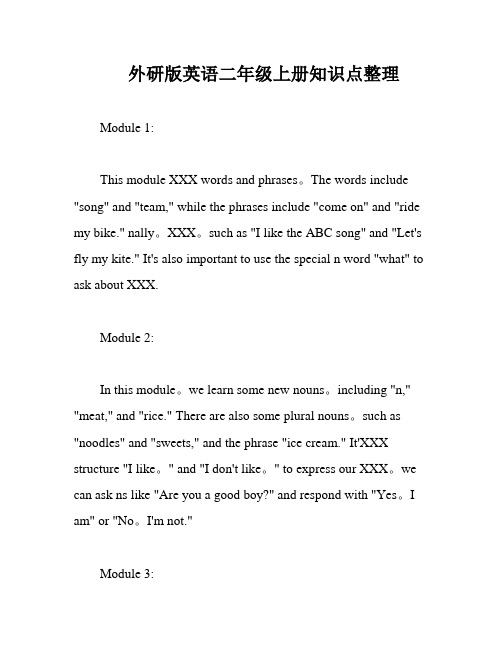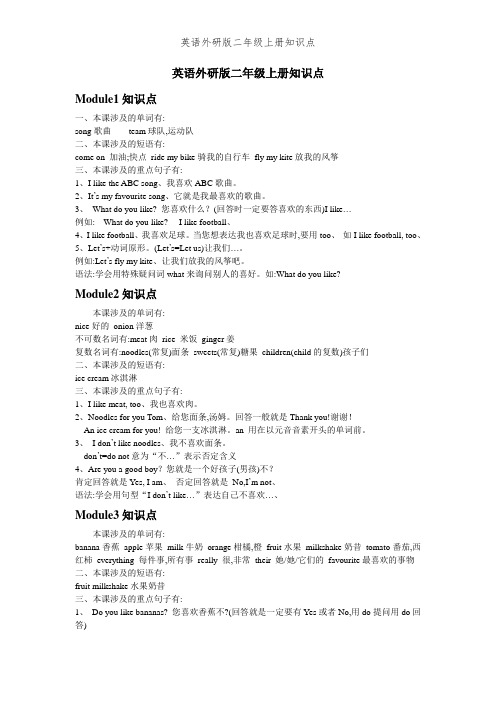外研版小学英语二年级上册知识点汇总
外研英语二年级上册

外研英语二年级上册一、单词部分。
(一)重点单词。
1. 动物类。
- cat(猫),发音:[kæt]。
例句:I have a cat.(我有一只猫。
)- dog(狗),发音:[dɒg]。
例如:The dog is very cute.(这只狗很可爱。
)- bird(鸟),发音:[bɜːd]。
如:A bird can fly.(鸟会飞。
)2. 颜色类。
- red(红色),发音:[red]。
可以说:The apple is red.(苹果是红色的。
)- blue(蓝色),发音:[bluː]。
例如:The sky is blue.(天空是蓝色的。
)- green(绿色),发音:[ɡriːn]。
像:The tree is green.(树是绿色的。
)3. 数字类(1 - 10)- one(一),发音:[wʌn]。
例如:I have one pen.(我有一支笔。
)- two(二),发音:[tuː]。
如:There are two books.(有两本书。
)- three(三),发音:[θriː]。
比如:I see three flowers.(我看到三朵花。
)- four(四),发音:[fɔː(r)]。
例句:There are four chairs.(有四把椅子。
)- five(五),发音:[faɪv]。
例如:I have five fingers.(我有五个手指。
)- six(六),发音:[sɪks]。
如:Six ducks are in the pond.(六只鸭子在池塘里。
)- seven(七),发音:[ˈsevn]。
比如:There are seven days in a week.(一周有七天。
)- eight(八),发音:[eɪt]。
例句:I am eight years old.(我八岁了。
)- nine(九),发音:[naɪn]。
例如:Nine balloons are floating.(九个气球在漂浮。
(完整版)英语外研版二年级上册知识点

英语外研版二年级上册知识点Module1知识点一、本课涉及的单词有:song歌曲team球队,运动队二、本课涉及的短语有:come on 加油;快点ride my bike骑我的自行车fly my kite放我的风筝三、本课涉及的重点句子有:1.I like the ABC song.我喜欢ABC歌曲。
2.It’s my favourite song.它是我最喜欢的歌曲。
3. What do you like? 你喜欢什么?(回答时一定要答喜欢的东西)I like…例如:---What do you like? ---I like football.4.I like football.我喜欢足球。
当你想表达我也喜欢足球时,要用too. 如I like football, too.5.Let’s+动词原形。
(Let’s=Let us)让我们…。
例如:Let’s fly my kite.让我们放我的风筝吧。
语法:学会用特殊疑问词what来询问别人的喜好。
如:What do you like?Module2知识点本课涉及的单词有:nice好的onion洋葱不可数名词有:meat肉rice 米饭ginger姜复数名词有:noodles(常复)面条sweets(常复)糖果children(child的复数)孩子们二、本课涉及的短语有:ice cream冰淇淋三、本课涉及的重点句子有:1.I like meat, too.我也喜欢肉。
2.Noodles for you Tom.给你面条,汤姆。
回答一般是Thank you!谢谢!An ice cream for you! 给你一支冰淇淋。
an 用在以元音音素开头的单词前。
3. I don’t like noodles.我不喜欢面条。
don’t=do not意为“不…”表示否定含义4.Are you a good boy?你是一个好孩子(男孩)吗?肯定回答是Yes, I am. 否定回答是No,I’m not.语法:学会用句型“I don’t like…”表达自己不喜欢….Module3知识点本课涉及的单词有:banana香蕉apple苹果milk牛奶orange柑橘,橙fruit水果milkshake奶昔tomato番茄,西红柿everything 每件事,所有事really 很,非常their 他/她/它们的favourite最喜欢的事物二、本课涉及的短语有:fruit milkshake水果奶昔三、本课涉及的重点句子有:1. Do you like bananas? 你喜欢香蕉吗?(回答是一定要有Yes或者No,用do提问用do回答)Yes, I do./No, I don’t .2. Do they like apples? 他们喜欢苹果吗?Yes, they do./No, they don’t .3. What’s that? 那是什么?that意为那个,那,表示远处的。
外研版一年级起点二年级上册

外研版一年级起点二年级上册一、单词部分。
1. 家庭成员类。
- father(爸爸)、mother(妈妈)、grandpa(爷爷;外公)、grandma(奶奶;外婆)、brother(哥哥;弟弟)、sister(姐姐;妹妹)。
- 例句:This is my father.(这是我的爸爸。
)2. 动物类。
- cat(猫)、dog(狗)、bird(鸟)、fish(鱼)、monkey(猴子)。
- 例如:I like my cat. It's very cute.(我喜欢我的猫。
它非常可爱。
)3. 颜色类。
- red(红色)、blue(蓝色)、green(绿色)、yellow(黄色)、black(黑色)、white(白色)。
- 可以说:The flower is red.(这朵花是红色的。
)4. 数字类。
- one(一)、two(二)、three(三)、four(四)、five(五)、six (六)、seven(七)、eight(八)、nine(九)、ten(十)。
- 如:I have three apples.(我有三个苹果。
)二、句型部分。
1. 介绍人物。
- This is...(这是……)- 例如:This is my sister. She is a student.(这是我的姐姐。
她是一名学生。
)2. 描述喜好。
- I like...(我喜欢……)- 比如:I like dogs. They are friendly.(我喜欢狗。
它们很友好。
)3. 描述颜色。
- It's...(它是……)- 像:The ball is blue.(这个球是蓝色的。
)4. 数数相关。
- How many...?(有多少……?)- 例如:How many pencils do you have? I have five.(你有多少支铅笔?我有五支。
)三、课文部分。
1. Unit 1.- 主题通常是关于家庭成员的介绍。
外研社版二年级英语上册

外研社版二年级英语上册一、单词部分。
(一)动物类。
1. cat(猫)- 读音:[kæt]。
- 例句:I like my cat. It is very cute.(我喜欢我的猫。
它非常可爱。
)2. dog(狗)- 读音:[dɒg]。
- 例句:The dog can run fast.(狗能跑得很快。
)3. bird(鸟)- 读音:[bɜːd]。
- 例句:Look! There is a beautiful bird in the tree.(看!树上有一只美丽的鸟。
)(二)颜色类。
1. red(红色)- 读音:[red]。
- 例句:The apple is red.(这个苹果是红色的。
)2. blue(蓝色)- 读音:[bluː]。
- 例句:The sky is blue.(天空是蓝色的。
)3. green(绿色)- 读音:[griːn]。
- 例句:The grass is green.(草是绿色的。
)(三)家庭成员类。
1. father(爸爸)- 读音:['fɑːðə(r)]。
- 例句:My father is a kind man.(我的爸爸是一个善良的人。
)2. mother(妈妈)- 读音:['mʌðə(r)]。
- 例句:Mother cooks delicious food for me.(妈妈给我做美味的食物。
)3. sister(姐妹)- 读音:['sɪstə(r)]。
- 例句:My sister likes reading books.(我的姐妹喜欢读书。
)二、句型部分。
(一)介绍事物。
1. This is...(这是……)- 例如:This is my book.(这是我的书。
)- 用法:用于向别人介绍离自己较近的单个事物。
2. That is...(那是……)- 例如:That is a big tree.(那是一棵大树。
外研版英语二年级上册知识点整理

外研版英语二年级上册知识点整理Module 1:This module XXX words and phrases。
The words include "song" and "team," while the phrases include "come on" and "ride my bike." nally。
XXX。
such as "I like the ABC song" and "Let's fly my kite." It's also important to use the special n word "what" to ask about XXX.Module 2:In this module。
we learn some new nouns。
including "n," "meat," and "rice." There are also some plural nouns。
such as "noodles" and "sweets," and the phrase "ice cream." It'XXX structure "I like。
" and "I don't like。
" to express our XXX。
we can ask ns like "Are you a good boy?" and respond with "Yes。
I am" or "No。
I'm not."Module 3:This module XXX fruits。
最新英语外研版二年级上册知识点.docx

英语外研版二年级上册知识点Module1 知识点一、本涉及的有:song 歌曲team 球 ,运二、本涉及的短有:加油;快点 ride my bike 我的自行 fly my kite 放我的筝三、本涉及的重点句子有:1.I like the ABC song. 我喜 ABC 歌曲 .2.It ’s my favourite song. 它是我最喜的歌曲.3. What do you like? 你喜什么?(回答一定要答喜的西) I like ⋯例如: ---Whatdo you like? ---I like football.4.I like football. 我喜足球 .当你想表达我也喜足球,要用 too. 如 I like football, too.5.Let ’s+原形 .( Let’s=Let us)我⋯ .例如: Let’s fly my kite. 我放我的筝吧.法:学会用特殊疑what 来人的喜好.如: What do you like?Module2 知识点本涉及的有:nice 好的 onion 洋葱不可数名有:meat 肉 rice 米ginger 姜复数名有: noodles(常复)面条 sweets(常复 )糖果 children ( child 的复数)孩子二、本涉及的短有:ice cream 冰淇淋三、本涉及的重点句子有:1.I like meat, too. 我也喜肉 .2.Noodles for you Tom. 你面条 ,姆 .回答一般是Thank you! !An ice cream for you!你一支冰淇淋.an 用在以元音音素开的前.3.I don ’tlike noodles. 我不喜面条 .don’t=do not 意“不⋯”表示否定含4.Are you a good boy ?你是一个好孩子(男孩)?肯定回答是Yes, I am. 否定回答是No,I ’m not.法:学会用句型“I don’tlike ⋯”表达自己不喜⋯.Module3 知识点本涉及的有:banana 香蕉 apple 苹果 milk 牛奶 orange 柑橘 ,橙 fruit 水果 milkshake 奶昔 tomato 番茄 ,西柿everything 每件事 ,所有事 really 很 ,非常 their 他 /她 /它的 favourite 最喜的事物二、本涉及的短有:fruit milkshake 水果奶昔三、本涉及的重点句子有:1. Do you like bananas? 你喜香蕉?(回答是一定要有Yes 或者 No, 用 do 提用 do 回答 )Yes, I do./No, I don ’t.2. Do they like apples? 他 喜 苹果 ? Yes,they do./No, they don ’t.3. What ’s that? 那是什么? that 意 那个 ,那 ,表示 的 .This 意 , 个表示近 的 .4.Here you are. 你 .回答用 Thank you ! !5. They like noodles and bananas and tomatoes and ⋯ noodles 常做复数用; banana---banana s tomato---tomato es6.It ’s their favourite. 米 是它 最喜 的食物 .their 意 他 /她 /它 的 ,如: their books 他 的 . 法:学 由Do 引 的一般疑 句Module5 知识点本 涉及的 有:poster 海 ,招 画 have 吃 ,喝 lunch 午餐 home 家 watch 看 TV 二、本 涉及的短 有:get up 起床go to school 上学play football 踢足球go home 回家play basketball 打 球 have lunch 吃午餐 拓展短 : have breakfast 吃早餐have dinner 吃晚餐 at 8 在 8 点三、本 涉及的重点句子有:1. This is my poster. Look! 是我的海 .看!2. At7, I get up. 在七点 ,我起床 .3. I have lunch at 12. 我在十二点吃午餐 .4.J is for jug. 字母在 jug 的开 .注意介for 和字母 Jj 、 Kk 的手写体的 写 .注意:表示“在几点 ”用介at 例如:在 6 点 ----at6Module4 知识点一、本 涉及的 有: too 太⋯ . one 一个 party 聚会 shirt 衫名 复数有: T-shirt — T-shirts dress — dressestrousers shoe — shoes二、本 涉及的短 有:too small 太小 doesn ’t=does not Here ’s a T-shirt for you! 你一件三、 住下列 人称代 :不 look at 看 at a party 在一个聚会上 here ’s=here is 是 T 恤衫 . Here ’s ⋯ for ⋯ 送 比人一 西 .第一人称 第二人称 第三人称数I (我) you (你) he (他) she (她) it (它) 复数we( 我 )you(你 )they (他 /她 /它 )注意:第一人称 数I (我 ) 是大写的 .1.、第三人称 数有:he,she,it 个名( 个人名和称呼例如: Sam,my mum ) , 个物2.、(1)主 第三人称 数表示(肯定)喜,用 likes ( like 后加 s )例如: He likes T-shirts 他喜 T 恤衫 .My dad likes cars. 我爸爸喜 小汽.( 2)主 第三人称 数表示(否定)不喜 ,用 doesn ’tlike例如: He doesn ’tlike the yellow T-shirt.他不喜 件黄色的 T 恤衫 .Sam doesn ’tlike this shirt. 姆不喜 件 衫.口: does, doesn’t是盗 ,s,es往回抱 .3.、( 1)主其他人称即:第一人称和第二人称复数、第三人称复数(I,we,you,they )表示(肯定)喜,用 like例如: I like cats. 我喜猫 .They like T-shirts. 他喜T 恤衫 .( 2)主其他人称即:第一人称和第二人称复数、第三人称复数(I,we,you,they )表示(否定)不喜,用 don’tlike例如: I don ’tlike meat. 我不喜肉 .We don’tlike bananas.我不喜香蕉.4、 this 个(数) +一个(数)these 些(复数)+两个或两个以上(复数)例如: this boy 个男孩these boys 些男孩This T-shirt 件 T 恤衫these dresses 些裙子注意: trousers 子、 clothes 衣服只能用these,不能用 this.指示代:数复数近this ( ,个)these(些)that(那 ,那个 )those(那些 )Module6 知识点1、需要掌握的有:on 在⋯候 Sunday 星期日 park 公园 great 太好了 ,好极了 goal 球 ,得分 live 居住 moon 月亮 sky 天 ,天空 city 城市 hooray 好 ,好哇2、需要掌握的短有:on Sundays 在每个星期日play football 踢足球go to school 去学校at the park 在公园a big city 一个大城市live in 居住在⋯3、需要掌握的句子有:(1) What do you do on Sundays 你每个周日做了什么? I play football on Sundays. 我每个星期日踢足球 .注意:第一个do 没有在意 .第二个 do 是”做”的意思 .要每个周日做了什么用句型:What do you do on Sundays ?回答:主+原形(2) Where do you play football ?你在哪里踢足球?I play at the park. 我在公园踢足球.注意:如果用where 提 ,回答地点 .(3) Where do you live?I live in Beijing.你住在哪里?我住在北京.Live in ⋯住在⋯地名写是:拼音不加声 ,开字母要大写 ,例如: Daqing (4) I likeswimming and basketball. 我喜游泳和球 .Like sth. 喜某事例如:I like books.我喜.Like doing sth.喜做某事例如:I like reading books.我喜.(5) Is it a big city ?它是一个大城市?Yes, it is. / No, it isn ’t.(此句一般疑句,回答必有Yes 或者 No)法:学由what 和 where 引的特殊疑句.Module7 知识点1.本模需要掌握的有:how 怎 ,如何 train 火 bus 公共汽 by 乘,坐(交通工具) walk 步行 goes(go 的三形式) work 工作地点;工作 bike 自行 with 与⋯在一起;同;跟;和 run 跑 ,奔跑holiday 假期then 然后ship 船plane 机love 喜2.本模需要掌握的短有:go to school 上学go to work 上班walk to school步行去学校by bus 乘公共汽by car 乘小汽by ship 乘船by bike 自行by plane 乘机by train 乘火on holiday 度假go to China 去中国go to Hainan 去海南3.本模需要掌握的句子有(1) How do you go to school ?你怎去上学?How 特殊疑 ,意思是”怎”,此句 how 引的特殊疑句 ,用来乘坐什么交通工具 .(2) I go to school by bus. 我乘公共汽去上学.by+ 交通工具 ,表示使用某种交通工具出行.注意: I walk to school.=I go to school on foot.我步行去上学.(3) How about your father ?你的爸爸呢?How about ⋯翻⋯怎么 ? / ⋯呢?(4) He goes by bus with my mother.with 意“和” ,主 he 是三 ,所以用 goes(5) I go to Hainan on holiday. 我去海南度假 .注意: holiday 意思是”假期”暑假: summer holiday寒假winter holiday城市名的英文写一般用拼音,开字母大写 ,例如大 Daqing ;上海 Shanghai.(6) We love China. 我中国 .China 中国首字母要大写Chinese 中国的 ,中国人 ,,文Love 和 like 用法相同 .Like sth. 喜某物love sth.某物like doing sth. 喜做某事love doing sth. 做某事法:和描述到某个地方采用的交通方式Module8 知识点3、本涉及的有:watches( watch 的三形式)看read e 来 music 音listen 听二、本涉及的短有:play football踢足球watchTV ( TV 两个字母都大写)看go swimming去游泳read books/read a book play with 玩⋯ at the weekend 在周末this weekend 周末play the piano 琴play the drums敲鼓listen to CDs 听光三、本涉及的句子有:1、 Have a good weekend!(祝你)周末愉快!2、 Children 孩子(名复数)-----child孩子(名数)3、 Like(喜) +名表示喜的西.例如: I like books.我喜.He likes football.他喜足球 .( books 和 football 都是名) .4、 Do you play football at the weekend ?周末你踢足球?此句一般疑句(Do+ 主 +原形?)肯定回答: Yes,I do.否定回答:No,I don’t.5、 She goes swimming. 她游泳 .She watches TV and she reads books.她看.注意:一般在主第三人称数(he,she,it,个人或物),加 s 或 es.主语为其他人称(I,you,we,they,两个或者两个以上的人或物时,动词用原形 .)例如: I play football. 我踢足球 . You go swimming.. 你游泳 .(动词 play 和 go 都用原形)6、 Does he play the piano ?他弹钢琴吗?此句为一般疑问句.肯定回答: Yes,she does. 是的 ,他吹 . 否定回答: No, she doesn’t.不 ,他不吹 .注意:一般现在时主语为第三人称单数(he,she,it,单个人或物)时,用 Does 构成一般疑问句 ,用 doesn’t构成否定句 ,动词都变为原形.7、 play 我们已经学了这个词的两个意思:”玩”和”演奏”需要注意: play+the + 乐器例如:play the drums敲鼓Play+ 球类例如:play football踢足球动词第三人称变化规则:以“ s, x, sh, ch, o”结尾的动词 ,要在词尾加“ -es”如: watch—watches go---goesModule9 知识点1、需要掌握的单词有:(1)季节( season)的单词: spring 春天summer 夏天autumn 秋天 winter 冬天(注意:要学会观察图片,了解四季的特点,认清图片)(2)衣服( clothes)的单词: jacket 夹克衫T-shirt T 恤衫sunglasses太阳镜sweater 毛衣coat 外套 glove 手套 shirt 衬衫 dress 连衣裙 trousers 裤子 shoe( s)鞋注意:分清夹克衫、衬衫、毛衣、 T 恤衫的图片 .(3)天气: warm 温暖的hot 炎热的cool 凉爽的cold 寒冷的互为反义词的有:warm-cool cold-hot 以前学过的还有:fat 胖的 -thin 瘦的big 大的-small 小的long 长的 -short 短的 tall 高的 -short 矮的scary 可怕的 -cute 可爱的2.本课涉及的短语有:go skating 去滑冰fly kites 放风筝in spring 在春天3.本课涉及的句子有:(1) It ’s spring. It ’s warm. We wear jackets. We don ’twear T-shirts. 春天来了 ,天气暖和了 ,我们穿夹克衫 ,我们不穿 T 恤衫 .It ’s=it is in spring在某个季节:用介词in(2) What does he do in Summer ?他在夏天干什么?He goes swimming in Summer. 他在夏天去游泳.语法:继续学习由what 引导的特殊疑问句.Module10 知识点1、本课涉及的单词有:year 年 ,年份eat 吃Chinese 中国的have 有 dinner 正餐 ,主餐2、本课涉及的短语有:New Year 新年 n 进来Chinese New Year 中国的新年In England 在英国Christmas tree 圣诞树Christmas presents 圣诞礼物have a big dinner 吃大餐sing songs 唱歌表示节日的单词有:儿童节:Children ’s Day父亲节Father’s Day母亲节Mother’s Day 教师节 Teachers’Day圣诞节Christmas新年New Year3、本课涉及的句子有:(1) A present for you. 给你的礼物 .注意介词用for(2) What are these?They are dumplings. 这些是什么?它们是饺子.this 这个(单数 ,近指)that(单数 ,远指)these(复数 ,近指)those(复数 ,远指)(3) What are thse/those?回答可用: They are+可数名词复数 +( -s/es)What is this/that ?回答可用: It ’s a/an+可数名词单数.例如 :What are these?这些是什么?They are ducks.它们是鸭子 .these 和 those 后接 be 动词 are)What is this? 这是什么? It ’s a duck. 它是一只鸭子(this 和 that 后接 be 动词 is)(4) We eat dumplings at Chinese New Year. 我们在中国的新年吃饺子.注意介词”at”表示”在”如果主语为(he,she,it,单个人或物)时,动词变为第三人称单数形式加-s/es例如:他吃饺子He eats dumplings.(5) What do you do at Chinese New Year ?你们在中国的新年做些什么?We watch TV.(6) Christmas is in winter. 圣诞节是在冬天.注意: be 动词用 is.某个季节用介词in.例如: in winter(7) In the UK, we have Christmas. 在英国 ,我们过圣诞节 .注意:在某个国家用介词in in China 在中国(8) A zebra in the zoo. 在动物园里的一只斑马. In the zoo 在动物园里。
英语外研版二年级上册知识点

英语外研版二年级上册知识点集团档案编码:[YTTR-YTPT28-YTNTL98-UYTYNN08]英语外研版二年级上册知识点Module1知识点一、本课涉及的单词有:song歌曲team球队,运动队二、本课涉及的短语有:comeon加油;快点ridemybike骑我的自行车flymykite放我的风筝三、本课涉及的重点句子有:1.IliketheABCsong.我喜欢ABC歌曲。
2.It’smyfavouritesong.它是我最喜欢的歌曲。
3.Whatdoyoulike你喜欢什么?(回答时一定要答喜欢的东西)Ilike…例如:---Whatdoyoulike---Ilikefootball.4.Ilikefootball.我喜欢足球。
当你想表达我也喜欢足球时,要用too.如Ilikefootball,too.5.Let’s+动词原形。
(Let’s=Letus)让我们…。
例如:Let’sflymykite.让我们放我的风筝吧。
语法:学会用特殊疑问词what来询问别人的喜好。
如:WhatdoyoulikeModule2知识点本课涉及的单词有:nice好的onion洋葱不可数名词有:meat肉rice米饭ginger姜复数名词有:noodles(常复)面条sweets(常复)糖果children(child的复数)孩子们二、本课涉及的短语有:icecream冰淇淋三、本课涉及的重点句子有:1.Ilikemeat,too.我也喜欢肉。
2.NoodlesforyouTom.给你面条,汤姆。
回答一般是Thankyou!谢谢!Anicecreamforyou!给你一支冰淇淋。
an用在以元音音素开头的单词前。
3.Idon’tlikenoodles.我不喜欢面条。
don’t=donot意为“不…”表示否定含义4.Areyouagoodboy?你是一个好孩子(男孩)吗?肯定回答是Yes,Iam.否定回答是No,I’mnot.语法:学会用句型“Idon’tlike…”表达自己不喜欢….Module3知识点本课涉及的单词有:banana香蕉apple苹果milk牛奶orange柑橘,橙fruit水果milkshake奶昔tomato番茄,西红柿everything每件事,所有事really很,非常their他/她/它们的favourite 最喜欢的事物二、本课涉及的短语有:fruitmilkshake水果奶昔三、本课涉及的重点句子有:1.Doyoulikebananas你喜欢香蕉吗(回答是一定要有Yes或者No,用do提问用do回答) Yes,Ido./No,Idon’t.2.Dotheylikeapples他们喜欢苹果吗?Yes,theydo./No,theydon’t.3.What’sthat那是什么?that意为那个,那,表示远处的。
英语外研版二年级上册知识点

英语外研版二年级上册知识点Module1知识点一、本课涉及的单词有:song歌曲team球队,运动队二、本课涉及的短语有:come on 加油;快点ride my bike骑我的自行车fly my kite放我的风筝三、本课涉及的重点句子有:1、I like the ABC song、我喜欢ABC歌曲。
2、It’s my favourite song、它就是我最喜欢的歌曲。
3、What do you like? 您喜欢什么?(回答时一定要答喜欢的东西)I like…例如:---What do you like? ---I like football、4、I like football、我喜欢足球。
当您想表达我也喜欢足球时,要用too、如I like football, too、5、Let’s+动词原形。
(Let’s=Let us)让我们…。
例如:Let’s fly my kite、让我们放我的风筝吧。
语法:学会用特殊疑问词what来询问别人的喜好。
如:What do you like?Module2知识点本课涉及的单词有:nice好的onion洋葱不可数名词有:meat肉rice 米饭ginger姜复数名词有:noodles(常复)面条sweets(常复)糖果children(child的复数)孩子们二、本课涉及的短语有:ice cream冰淇淋三、本课涉及的重点句子有:1、I like meat, too、我也喜欢肉。
2、Noodles for you Tom、给您面条,汤姆。
回答一般就是Thank you!谢谢!An ice cream for you! 给您一支冰淇淋。
an 用在以元音音素开头的单词前。
3、I don’t like noodles、我不喜欢面条。
don’t=do not意为“不…”表示否定含义4、Are you a good boy?您就是一个好孩子(男孩)不?肯定回答就是Yes, I am、否定回答就是No,I’m not、语法:学会用句型“I don’t like…”表达自己不喜欢…、Module3知识点本课涉及的单词有:banana香蕉apple苹果milk牛奶orange柑橘,橙fruit水果milkshake奶昔tomato番茄,西红柿everything 每件事,所有事really 很,非常their 她/她/它们的favourite最喜欢的事物二、本课涉及的短语有:fruit milkshake水果奶昔三、本课涉及的重点句子有:1、Do you like bananas? 您喜欢香蕉不?(回答就是一定要有Yes或者No,用do提问用do回答)Yes, I do、/No, I don’t 、2、Do they like apples? 她们喜欢苹果不?Yes, they do、/No, they don’t 、3、What’s that? 那就是什么?that意为那个,那,表示远处的。
- 1、下载文档前请自行甄别文档内容的完整性,平台不提供额外的编辑、内容补充、找答案等附加服务。
- 2、"仅部分预览"的文档,不可在线预览部分如存在完整性等问题,可反馈申请退款(可完整预览的文档不适用该条件!)。
- 3、如文档侵犯您的权益,请联系客服反馈,我们会尽快为您处理(人工客服工作时间:9:00-18:30)。
外研版小学英语二年级上册知识点汇总外研(一起)二年级Module 1 知识汇总一、词汇song(歌曲)come(加油;快点)team(球队,运动队)二、习惯搭配三、26个英文字母:四、重点句型:1. 询问对方喜欢什么的句型:-What do you like?-I like + 其他.eg: 1. -What do you like?-I like my book.2. -What do you like?-I like your kite.2. Let’s + 动词原形 + 其他.eg: 1. Let’s go to school.2. Let’s fly my kite.外研(一起)二年级Module 2 知识汇总一、词汇食物:meat(肉)noodles(面条)rice(米饭)onion(洋葱)sweets((常复)糖果)ginger(姜)ice cream(冰淇淋)其他:children((child的复数)孩子们)nice(好的)mm (呣)二、习惯搭配三、常用表达:四、知识点:be good for ... (对......有好处)五、重点句型:1.描述某人喜欢的食物的句子:I like + 食物名称.eg: I like ice cream.2.描述某人不喜欢的食物的句子:I don’t like + 食物名称.eg: I don’t like ginger.外研(一起)二年级Module 3 知识汇总一、词汇水果:banana(香蕉) orange(柑橘,橙)apple(苹果)tomato(番茄,西红柿)其他:milk(奶,牛奶) fruit(水果)milkshake(奶昔)everything(每件事,所有事物)really(很,非常)their 他(她/它)们的favourite(最喜欢的事物)二、惯用表达二、重点句型:1.询问“某人喜欢什么吗”的句型及其答语:-Do you like...?-Yes, I do./ No, I don’t.eg: 1. -Do you like milk?-Yes, I do.2. -Do you like bananas?-No, I don’t.外研(一起)二年级Module 4 知识汇总一、单词缩写形式:1. here’s = here is 这是 2. doesn’t = does not 不其它:1. T–shirt T恤衫 2. hm 嗯,唔3. dress 连衣裙4.too 太……5.one 一个6.trousers 裤子7. party 聚会三、习惯搭配 at a party 在聚会上三、惯用表达1.Thank you. 谢谢你。
2.He likes football. 他喜欢足球。
3.Amy likes dresses. 艾米喜欢连衣裙。
4.Sam likes T-shirt. 萨姆喜欢T恤衫。
5.Sam, here’s a T-shirt for you. 萨姆,这是给你的T恤衫。
6.Amy, here’s a dress for you. 艾米,这是给你的连衣裙。
7.He doesn’t like the yellow T-shirt. 他不喜欢这件黄色T恤衫。
8.He doesn’t like these clothes. 他不喜欢这些衣服。
9.He doesn’t like these shoes. 他不喜欢这些鞋。
10.I like these red shoes and the white dress. I don’t like the red dress.我喜欢这些红色的鞋和白色的连衣裙。
我不喜欢这个红色的连衣裙。
四、重点句型1. He / She likes + 名词.eg: He likes football. 他喜欢足球。
She likes dancing. 她喜欢跳舞。
2. He / She doesn’t like + 名词.eg: He doesn’t like these trousers. 他不喜欢这些裤子。
She doesn’t like oranges. 她不喜欢橘子。
外研(一起)二年级Module 5 知识汇总一、词汇1.poster海报,招贴画2.have 吃,喝3.lunch 午餐4.home 家5.watch 观看 电视;电视机二、常用短语1.get up 起床2.go to school 去上学3.have lunch 吃午餐4.go home 回家5.watch TV 看电视6.play football 踢足球7.play basketball 打篮球三、常用句型1.At 7, I get up. 七点,我起床。
2.Here’s a bird for you. 给你一只鸟。
3.This is my poster. 这是我的海报。
4.I don’t play basketball. 我没有打篮球。
5.I go home at 5. 我五点回家。
6.I watch TV at 9. 我九点看电视。
四、重点语法①吃午餐/早餐/晚餐用动词haveeg: have breakfast 吃早餐have lunch 吃午餐have dinner 吃晚餐②表示在几点用介词 ateg: I have lunch at 12. 我在12点吃午餐。
At 8, I go to school. 我八点去上学。
I play football at 5. 我五点踢足球。
外研(一起)二年级Module 6 知识汇总一、词汇on在......的时候 Sunday星期日 park公园great太好了,好极了 goal进球,得分hooray(表示激动与高兴的呼喊声)好,好哇live居住moon月亮 sky天,天空city城市二、短语play football踢足球go to school去学校at the park在公园go swimming去游泳三、句子1.Let’s play together.(让我们一起玩吧。
)2.I like swimming and basketball.(我喜欢游泳和篮球。
)3.-- What do you do >(星期天你做什么?)-- I play football.(我踢足球。
)4.-- Where do you play football?(你在哪踢足球?)-- At the park.(在公园里。
)5.-- Where do you live?(你住在哪儿?)-- I live in Shanghai.(我住在上海。
)四、句型结构①-- What do you do on Sundays?-- I + 动词原形 + 其他.eg: -- What do you do >(你星期天做什么?)-- I play basketball.(我打篮球。
)-- Where do you + 动词原形 + 其他? -- I + 动词原形 + 其他.eg: 1. -- Where do you play basketball?(你在哪打篮球?)-- I play basketball in the playground.(我在操场打篮球。
)2. -- Where do you live?(你住在哪儿?)-- I live in Beijing.(我住在北京。
)五、语法知识u play + 球类名称eg: play basketball(打篮球)play baseball(打棒球)外研(一起)二年级Module 7 知识汇总一、词汇how 怎样,如何 train 火车 chug (发动机)发出咔嚓声bus 公共汽车 beep (汽车喇叭)嘟嘟声 by 乘,坐(交通工具)walk 步行 How about…? ……怎么样?goes (go的第三人称单数形式)去 work 工作地点;工作go to work 去上班 with 与…在一起;同;跟;和run 跑,奔跑 holiday 假期 on holiday 度假 then 然后ship 轮船 plane 飞机 love 喜爱 bike 自行车二、句子1.-- How do you go to school, Amy? (你是怎么去学校的,艾米?)-- I go to school by bus. (我乘公共汽车去学校。
)2. - How do you go to school? (你是怎么去学校的?)-- I walk to school. (我走路去学校。
)3 -- How about your father? (你爸爸呢?)-- He goes to work by bike. (他骑自行车上班。
)4.-- Do you go to Beijing by train? (你坐火车去北京吗?)-- No, I don’t. (不是,我没有坐火车去北京。
)5.-- Do you go by plane? (你坐飞机去吗?)-- Yes, I do. (是的,我坐飞机去。
)6.I go to Hainan on holiday. I go by train. Then I go by ship. (我去海南度假。
我坐火车去。
然后我坐船去。
)7.We go to China on holiday. We go by plane. We love China.(我们去中国度假。
我们坐飞机去。
我们爱中国。
)三、句型结构①-- How do/ does+人称go (to) +地点?-- 人称+ go/ goes (to) +地点+交通方式.eg: -- How do you go to school?(你是怎么去学校的?)-- I go to school by bike. (我骑自行车去学校。
)-- How does your sister go home? (你姐姐是怎么回家的?)-- She goes home by bus. (她坐公交车回家。
)②-- How do/ does+人称go (to) +地点?-- 人称+ walk/ walks (to) +地点.eg: -- How does your mother go to work? (你妈妈是怎么去上班的?)-- She walks to work. (她步行去上班。
)-- How do you go home? (你怎么回家?)-- I walk home. (我步行回家。
)③-- Do/ Does+人称+go (to) +地点+交通方式?-- Yes, 人称+do/ does. / No, 人称+ don’t/ doesn’t.eg: -- Does your brother go to school by car? (你哥哥坐汽车去学校吗?)-- Yes, he does. (是的,他坐汽车去学校。
